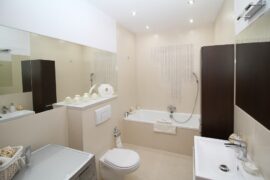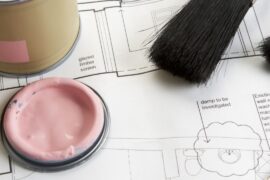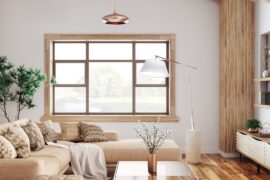
Florida, known for its sunny beaches, diverse culture, and unique architectural styles, offers a dynamic backdrop for homeowners looking to embark on a home improvement journey. The state’s housing market presents a variety of options, among which fixer-upper houses have gained popularity. These properties, often requiring significant renovations, attract homeowners with the promise of a personalized space. Whether it’s the coastal charm of Fort Lauderdale or the bustling streets of Miami, buying a fixer-upper in Florida allows individuals to tailor their homes to their specific tastes, making it an intriguing prospect for many.
1. Pro: Potential for Lower Purchase Price
One of the most appealing aspects of purchasing a fixer-upper in Florida is the potential for a lower initial purchase price. These properties are typically listed below market value due to their need for repairs and updates. This price reduction can make homeownership more accessible, especially in sought-after areas of Florida where property prices are generally high. It’s an opportunity to invest in a neighborhood that might otherwise be out of reach. Additionally, the process of moving into a fixer-upper can be made smoother with the help of professional movers in Fort Lauderdale, who can handle the logistics of relocating while you focus on the renovation plans.
2. Con: Unexpected Costs and Overruns
However, the lower purchase price of a fixer-upper can be deceptive. Renovation projects often come with unexpected costs and budget overruns. What might initially seem like a simple repair can uncover more significant issues, particularly in older homes common in some Florida neighborhoods. These unforeseen expenses can accumulate quickly, turning what seemed like a bargain into a costly endeavor. Homebuyers should be prepared for potential additional investments, from plumbing updates to structural repairs, which can stretch the budget beyond initial estimates.
3. Pro: Customization Opportunities
Fixer-uppers offer a blank canvas for customization that move-in-ready homes simply can’t match. In Florida, where individual style and functionality are key, this means the ability to design a home that perfectly suits your lifestyle and preferences. Whether it’s creating an open-plan living space, designing a custom kitchen, or adding features like a pool or a sunroom to enjoy the Florida sun, the possibilities are endless. This level of customization allows homeowners to not only tailor the aesthetics of their homes but also upgrade with modern amenities and sustainable technologies.
4. Con: Time-Consuming Renovations
The process of renovating a fixer-upper is often more time-consuming than many homeowners anticipate. From planning and obtaining permits to the actual construction work, the timeline can extend far beyond initial expectations. This can be particularly challenging in Florida, where weather conditions like heat and humidity, as well as hurricane season, can affect construction schedules. For those who aren’t able to dedicate significant time to oversee and manage these projects, the delay can lead to frustration and inconvenience, especially if living in the home during renovations.
5. Pro: Increased Home Value
A well-executed fixer-upper project can significantly increase the home’s value. In Florida’s competitive real estate market, strategically renovated homes can fetch a higher price, making them a sound investment. This is particularly true in up-and-coming neighborhoods or areas with high demand. By updating a fixer-upper, homeowners can build equity quickly, often surpassing the initial investment in renovations. The key is to focus on renovations that offer the best return on investment, such as updating kitchens and bathrooms, improving curb appeal, and adding square footage or outdoor living spaces.
6. Con: Living in a Construction Zone
Renovating a fixer-upper in Florida often means living in a construction zone for an extended period. This can be a significant inconvenience, especially for families with children or pets. The constant noise, dust, and disruption of daily routines can create a stressful living environment. Moreover, certain areas of the house may be unusable for periods, requiring adjustments to your lifestyle. This aspect of fixer-upper renovation requires serious consideration, as the impact on your daily life can be substantial and sometimes underestimated.
7. Pro: Learning and Skill Development
For those inclined towards DIY projects, renovating a fixer-upper offers an invaluable opportunity for learning and skill development. Tackling different aspects of home renovation, from painting to tiling, can enhance your practical skills and knowledge. Florida homeowners, in particular, can benefit from understanding the specifics of local building techniques and materials suited to the climate. This hands-on experience can be rewarding and empowering, providing you with skills that are useful for ongoing maintenance and future projects.
8. Con: Navigating Permits and Regulations
One of the more daunting aspects of fixing up a home is dealing with permits and regulations. In Florida, these can be particularly complex due to strict building codes, especially in coastal areas prone to hurricanes. Navigating this bureaucracy can be time-consuming and frustrating, requiring a significant amount of research and patience. Professional contractors are usually familiar with these processes, but as a homeowner, you’ll need to ensure that all renovations are compliant. Failure to do so can result in legal issues and costly corrections down the line.
9. Pro: Sense of Achievement and Personal Satisfaction
Transforming a fixer-upper into your dream home can provide a profound sense of achievement and personal satisfaction. Witnessing the transformation of a neglected property into a beautiful and functional space can be incredibly rewarding. For many homeowners in Florida, where individuality and personal style are highly valued, this personal satisfaction is a significant motivating factor. The end result is a home that not only meets your needs and tastes but also carries a personal touch that cannot be replicated in a ready-to-move-in property.
10. Con: Potential for Lower Resale Value
While renovating a fixer-upper can increase its value, there’s also the risk that the renovations won’t yield a high return on investment, especially if the market changes or if the renovations are too personalized. In Florida’s diverse real estate market, it’s important to make strategic renovation decisions that appeal to a broad audience. Over-customizing or over-spending on renovations can make it difficult to recoup the investment when it’s time to sell. This risk needs to be carefully weighed against the potential benefits of customizing a fixer-upper.
Conclusion
Buying and renovating a fixer-upper in Florida comes with a unique set of pros and cons that require careful consideration. The allure of a lower purchase price and the opportunity for customization and increased home value are balanced by the challenges of unexpected costs, time-consuming renovations, and the complexities of navigating permits and regulations. The decision to purchase a fixer-upper should be based on a realistic assessment of your budget, time, skills, and tolerance for living in a construction zone. For those prepared to take on the challenge, the rewards can be significant – from financial benefits to the satisfaction of creating a personalized home. Ultimately, a fixer-upper can be a wise investment and a fulfilling project, provided you enter the process with open eyes and a well-thought-out plan.
Paid Guest Post










